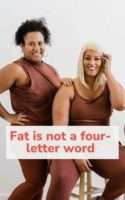What’s that one thing a doctor said or did that made you not want to go back to a doctor again? I’ll go first.
It was winter and my throat was sore. It got progressively worse, so I decided to see my doctor. I went, assuming it would be a regular check-up and a diagnosis of tonsilitis. She took my temperature, looked down my throat and prescribed some antibiotics.
Just as I was getting ready to leave, however, she asked me to get on the scale. It made me feel uncomfortable because, at that stage of my life, I wasn’t happy with my body and was actively dieting. I agreed to do it, though, because I felt intimidated and was under the assumption that doctors act in their patients’ best interests.
She weighed me, sat me down afterwards and told me to eat more salad.
I tried to hold back the tears and felt the blood rush to my cheeks as she ushered me out of her office. I remember crying in the car on the way home, feeling worse about my body than I had ever felt in my life.
It took me a while to get over that experience. But in doing so I realised that I wasn’t the problem. She was. She didn’t respect my reason for visiting her and she certainly didn’t respect me enough to keep her opinions about my body to herself. She was fatphobic.
Fatphobia is a fear and disdain of fatness that manifests itself in shaming (because of the idea that fat people are lazy and disgusting), guilt-tripping (because of the idea that being fat is a choice and we’re not working hard enough to be thin), and weight bias (the idea that fat people are less deserving of proper care and treatment than thin people are).
I’m fat. I’m not curvy or thick. I’m fat. However, despite what popular media and society-at-large keep trying to tell me, I don’t consider it a bad thing. The word fat is a descriptor. It holds no moral value, it’s not tied to my worth or deservingness, and it’s certainly not as scary as everyone makes it out to be. If I can look at someone and call them thin, why can’t I look at another and call them fat? To place these two words on a spectrum of good and bad is unfair.
Believe me, I have tried to change myself. I thought for so many years that if I just changed the way I looked I would get the acceptance I so desperately craved. All this did was lead to an eating disorder and heaps upon heaps of self-loathing. I have come to realise that this is my body. It’s not going to change, nor should it have to.
I’ve worked really hard to get to a place of accepting my body, just the way it is. I won’t lie to you – I don’t love my body all the time. Some days, I don’t even like it. What I try to do is show it respect. The ideal of loving your body can feel like yet another unattainable goal; another thing to fail at. What feels more achievable, for today at least, is thanking my body for carrying me through a pandemic, through pain and trauma, and making a promise that I will no longer abuse it.
I walk around this world, every day, knowing my fellow humans are expecting me to apologise for existing. They are expecting me to shrink myself – literally and figuratively. They are expecting me to make myself more palatable; easier to digest.
I also know they are completely offended by my resistance. Some days it’s because I wear shorts that show my cellulite and stringy tops that expose my flabby arms. Other days it’s because I don’t move out of the way, and walk with my head held high. Who gave me the right?
I did. I gave myself the right. I do not need your permission to love myself. I do not need your validation to feel whole and worthy. I do not need you to be ok with me taking up space. I am not here for your entertainment or to make you feel better about yourself.
Your hatred of me is your problem. It has nothing to do with me and probably stems from years and years of unprocessed trauma, toxic societal conditioning and, for many, internalised fatphobia.
If you want to do something about this – change the way we demonise fat people in this world – stop commenting on people’s bodies (even if they’ve lost weight). Stop complaining about how much you’ve eaten. Stop talking about a “bikini body” as if only certain bodies belong in bikinis. Stop looking at fat people as works-in-progress.
Tell us: Have you been fat-shamed? Or have you ever fat-shamed?
If you enjoyed this article, you may also enjoy… what if its toxic positivity?



